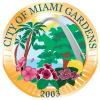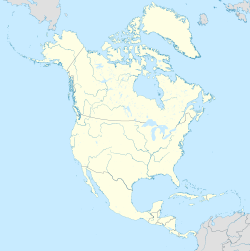|
Miami Gardens, Florida
Miami Gardens is a city in north-central Miami-Dade County, Florida, United States. It is a suburb of Miami and located 16 miles (26 km) north of Downtown Miami with city boundaries that stretch from I-95 and Northeast 2nd Avenue to its east to Northwest 47th and Northwest 57th Avenues to its west, and from the Broward County line to its north to 151st Street to its south.[4] The city's name originated from Florida State Road 860, a major roadway through the area also known as Miami Gardens Drive. It had a population of 111,640 as of 2020. Miami Gardens is Florida's most populous city with a majority African American population and also home to the largest percentage of African Americans (66.97 percent) of any city in Florida, according to the U.S. Census Bureau.[5] It is a principal city in the Miami metropolitan area of South Florida, which is the nation's ninth-largest, and world's 65th-largest metropolitan area with a population of 6.158 million people as of 2020. Miami Gardens is the home of Hard Rock Stadium, a 64,767 capacity multi-purpose stadium that serves as the home field for both the Miami Dolphins of the National Football League and the Miami Hurricanes, the University of Miami's NCAA Division I college football team. HistoryIn the wake of the construction of I-95 in the late 1960s, many middle- and upper-income African American and West Indian American families migrated from Miami neighborhoods like Liberty City to what became Miami Gardens (also called Carol City, Norland, or Norwood) as race-based covenants were outlawed with the Fair Housing Act, and mostly lower income blacks moved into the Liberty City and Little Haiti neighborhoods surrounding Liberty Square and Edison Courts. Miami Gardens was incorporated on May 13, 2003.[4] The city's neighborhoods of Andover, Bunche Park, Carol City, Lake Lucerne, Norland, Opa-locka North, and Scott Lake were previously unincorporated areas within Miami-Dade County. In 2007, Mayor Shirley Gibson said that the city would no longer allow any low-income housing developments; many residents blamed the developments for spreading crime and recreational drugs throughout the city. Around that time, the city's tax revenues dropped to the third-lowest in Miami-Dade County.[6] In 2012, Oliver Gilbert, only the second mayor the city has had, proposed forming a community redevelopment agency (CRA).[7] CRAs are formed to remove "slum and blight", to improve the physical environment of the city and to combat the social and economic problems typical of slum areas. CRAs are funded with property tax increases, which funds are used, in part, to stimulate private investment in the rehabilitation of the community.[7] During the 2026 FIFA World Cup, Hard Rock Stadium will host multiple matches during the tournament.[8][9] Demographics
The city was incorporated in 2003, but various parts of the city appeared as census designated places in the 2000 census and previous censuses. In addition to the Miami Gardens CDP (pop. 2,706 in 2000), the remainder make up the neighborhoods of Andover, Bunche Park, Carol City, Lake Lucerne, Norland, Opa-locka North, and Scott Lake. The United States Census Bureau enumerated that the population of Miami Gardens was 111,640 per the 2020 census.[13] 2010 and 2020 Census
As of the 2020 United States census, there were 111,640 people, 30,946 households, and 23,158 families residing in the city.[14] As of 2016, the age distribution was 5.6% under the age of 5, 6.7% from 5 to 9, 6.5% from 10 to 14, 15.5% from 15 to 24, 14.6% from 25 to 34, 12.7% 35 to 44, 13.1% 45 to 54, 12.6% 55 to 64, and 12.7% who were 65 years of age or older. The population was 46.9% male and 53.1% female. Families made up 72% of households, while 28% were non-families. The average household size was 3.52 members, and the city covered 20 square miles (52 km2).[15] As of the 2010 United States census, there were 107,167 people, 32,000 households, and 23,749 families residing in the city.[16] In 2010, 6.0% of households were vacant.[10] Hispanic population
Crime ratesAccording to City Rating, Miami Gardens crime statistics have decreased in the past 13 years. The crimes that have decreased the most are property crimes and violent crimes. The crime rate for Miami Gardens for 2018 is expected to be lower than in 2016.[needs update] Miami Garden's 2016 violent crime rate was 63.64% higher than the national violent crime rate, and the property crime rate was 30.99% higher than the national property crime rate.[18] In 2016, Miami Gardens' violent crime rate was higher than that in Florida by 50.99%, and the property crime rate was 19.49% higher.[18] In 2016, there were 432 reported cases of aggravated assault, 22 reported cases of arson, 509 reported cases of burglary, 24 cases of forcible rape, 2,743 cases of larceny and theft, 419 reported cases of motor vehicle theft, 22 reported cases of murder and manslaughter, and 265 cases of robbery.[18] The projected[needs update] 2018 crime data is as follows: 286 reported cases of aggravated assault, 26 reported cases of arson, 435 reported cases of burglary, 7 cases reported of forcible rape, 2,139 cases reported of larceny and theft, 205 cases reported of motor vehicle theft, 18 reported cases of murder and manslaughter, and 102 reported cases of robbery.[19] Sports facilities The Calder Race Course opened in 1971. Miami Gardens is home to the Miami Dolphins, who play in Hard Rock Stadium on land that was part of the Lake Lucerne CDP. This stadium also hosts the annual Orange Bowl college football game, and is the home field for the University of Miami Hurricanes football team. The Miami Open tennis tournament is held on the grounds of the stadium. The Florida Marlins of Major League Baseball shared Hard Rock Stadium with the Dolphins for almost two decades until, in 2012, they relocated to Miami and changed their name to the Miami Marlins. In 2022, 2023 and 2024, the Miami International Autodrome hosted the Miami Grand Prix for Formula One.[20] HealthcareThe city of Miami Gardens has several health care clinics and facilities that offer medical care and support to its residents. Although the city has no hospital directly within its limits, Jackson North Medical Center, Concentra Urgent Care, and, Chen Medical Center provide medical services to the residents of Miami Gardens. Supplementing this, several health care clinics and facilities provide medical services that include general medicine, walk-in/urgent care, dental services, gynecology, physical therapy, chiropractor services, laboratory tests, x-rays, sonograms, osteoporosis screening, vaccinations, and health and exercise programs.[21] GovernmentMiami Gardens is governed by a seven-member city council. Members include Mayor Oliver Gilbert (since 2012), and six council members, four elected from districts and two elected citywide. The mayor recommends – and the city council hires – the City Manager, City Attorney, and City Clerk. These are 17 of the many departments for which the City Manager of Miami Gardens creates a budget.
Mayors
PoliceThe Miami Gardens Police Department is the lead law enforcement agency for the 110,000 residents living within the city's 20 square miles (52 km2). The department operates under a unified command structure with its headquarters located at 1020 NW 163 Drive, Miami Gardens, Florida 33169. The department became operational on Sunday, December 16, 2007, with 159 sworn officers. Since then, the department has grown to 259 members consisting of 201 sworn positions with 58 non-sworn support positions.[23] Police controversyIn 2013, law enforcement abuses were alleged regarding the Miami Gardens Police Department by several news outlets.[24][25][26] The abuses were first uncovered when it became public that a convenience store employee, Earl Sampson was arrested 27 times for trespassing, while working at and around the store at which he was employed. Video evidence was gathered by the owner of the store, Ali Saleh, showing Miami Garden police involved in clear and repeated misconduct involving his employee, and customers. According to the Miami Herald's Julie K. Brown: "The videos show, among other things, cops stopping citizens, questioning them, aggressively searching them and arresting them for trespassing when they have permission to be on the premises". It appeared Sampson had been arrested in this way due to police quotas, a department culture, and that Sampson was easy to arrest. Sampson always pleaded guilty so they would let him out almost immediately, with one exception where he pleaded not guilty, and he was jailed for 20 days. The guilty plea would validate the officers' improper arrest and increment their quota, so he became a continuous target. Volume of stopsIt was reported that, between 2008 and 2013, 99,980 stops occurred in Miami Gardens, involving 56,922 people, over half of the city's population. In the City of Miami, 3,753 stops occurred during the same period, with four times the population. Some stops involved children aged 5 to 7, totaling more than 1,000 children. These numbers were compiled after news regarding Earl Sampson.[27] Resignation and lawsuitsFollowing these reports, the police chief resigned.[28] Civil rights lawsuits have been filed against the Miami Gardens Police Department by the store owner and others who were illegally detained and/or arrested.[29][30] A police officer filed a lawsuit claiming that he had been fired for reporting abuses.[31] Economy
In 2003, Miami Gardens based Merchandize Liquidators was founded.[32] EducationPublic schoolsMiami-Dade County Public Schools operates area public schools.
Norland Middle School, in the Miami Gardens area, has a magnet program in dance, music, theatre and art, which began in 1985. The young actors Alex R. Hibbert and Jaden Piner, who starred in the Oscar-winning film Moonlight, were trained at this school.[34]
Private schoolsThe Archdiocese of Miami operates area Catholic schools. Monsignor Edward Pace High School is in the Miami Gardens city limits. The archdiocese formerly operated Saint Monica School in Miami Gardens.[35] Colleges and universities
Public librariesMiami-Dade Public Library System operates the North Dade Regional Library, which opened in September 1979.[36] Notable people
Surrounding areas
References
External linksWikimedia Commons has media related to Miami Gardens, Florida.
|
|||||||||||||||||||||||||||||||||||||||||||||||||||||||||||||||||||||||||||||||||||||||||||||||||||||||||||||||||||||||||||||||||||||||||||||||||||||||||||||||||||||||||||||||||||||||||||||||||||||||||||||||||||||||||||||||||||||||||||||||||||||||||||||||||||||||||||||||||||||||||||||||










